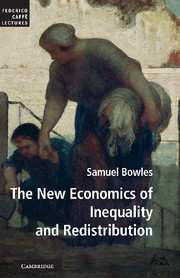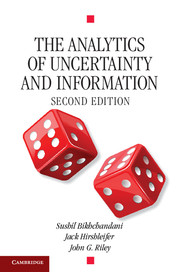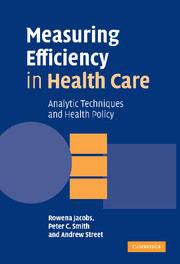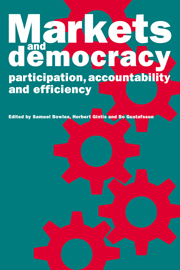The New Economics of Inequality and Redistribution
£59.00
Part of Federico Caffè Lectures
- Author: Samuel Bowles, Santa Fe Institute
- Date Published: July 2012
- availability: Available
- format: Hardback
- isbn: 9781107014039
£
59.00
Hardback
Other available formats:
Paperback, eBook
Looking for an inspection copy?
This title is not currently available on inspection
-
Economists warn that policies to level the economic playing field come with a hefty price tag. But this so-called 'equality-efficiency trade-off' has proven difficult to document. The data suggest, instead, that the extraordinary levels of economic inequality now experienced in many economies are detrimental to the economy. Moreover, recent economic experiments and other evidence confirm that most citizens are committed to fairness and are willing to sacrifice to help those less fortunate than themselves. Incorporating the latest results from behavioral economics and the new microeconomics of credit and labor markets, Bowles shows that escalating economic disparity is not the unavoidable price of progress. Rather it is policy choice - often a very costly one. Here drawing on his experience both as a policy advisor and an academic economist, he offers an alternative direction, a novel and optimistic account of a more just and better working economy.
Read more- Challenges the view that inequality promotes economic progress and puts forward policies that enhance both fairness and economic performance
- Presents a novel view of globalization and the welfare state, showing that neither are the enemy of well-designed egalitarian policies
- Written by a leading economist with experience of addressing real economic problems having served as an economic advisor to President Nelson Mandela, Senator Robert Kennedy and the Reverend Martin Luther King, Jr
Reviews & endorsements
'Over the past forty years, the gap between rich and poor has widened dramatically in many industrialised countries, and what Americans call the 'middle class' has shrunk. Samuel Bowles argues that, quite apart from its moral dimension, such inequality is economically inefficient. It leads to excessive expenditure on the enforcement of property rights and on crime prevention. It also reduces labour productivity. He argues that a redistribution of income and wealth would increase productivity and encourage entrepreneurship amongst social strata that are currently locked out of credit markets. These stimulating essays are a valuable contribution to the current debate about equality.' Robert Rowthorn, Emeritus Professor of Economics, University of Cambridge
See more reviews'Bowles and his collaborators show how, in a globalized world economy, independent democratic national states can implement programs of egalitarian redistribution and social insurance. Included are better educational opportunities, employee ownership of workplaces, land reform, stimulus to the formation of cooperatives, support of home ownership, expansion of subsidies designed to promote employment and increase earnings among the poor. But even better, Bowles also considers the Unconditional Basic Income proposed by Van Parijs and van der Veen, which would truly be a step in the direction of a society of real freedom for all. The book is especially relevant for all of us who would like to use the instruments of economic policy to advance the main principles of justice.' Eduardo Suplicy, Fundação Getúlio Vargas, Member of the Brazilian Senate, and Founder of the Workers' Party of Brazil
'Samuel Bowles offers both the world of science and the world of politics an extremely valuable synthesis of new thinking about inequality, integrating innovative analyses of fundamental causes, sustainable solutions, human behaviour and normative conceptions. Both unjustified 'equality pessimism' and traditional redistributive approaches are put to the test of rigorous analysis and empirical research. The outcome is an inspiring account of ways and means to create more just societies in today's global world.' Frank Vandenbroucke, University of Leuven, and former Minister, Belgian Government
Customer reviews
Not yet reviewed
Be the first to review
Review was not posted due to profanity
×Product details
- Date Published: July 2012
- format: Hardback
- isbn: 9781107014039
- length: 208 pages
- dimensions: 216 x 140 x 15 mm
- weight: 0.39kg
- contains: 34 b/w illus. 1 table
- availability: Available
Table of Contents
List of figures
List of tables
Preface
1. The new economics of inequality and redistribution
2. The economic cost of wealth inequality
3. Feasible egalitarianism in a competitive world
4. Cosmopolitans, parochials and the politics of social insurance
5. Altruism, reciprocity, and the politics of egalitarian redistribution
6. Conclusion
Appendices
Works cited
Index.
Sorry, this resource is locked
Please register or sign in to request access. If you are having problems accessing these resources please email [email protected]
Register Sign in» Proceed
You are now leaving the Cambridge University Press website. Your eBook purchase and download will be completed by our partner www.ebooks.com. Please see the permission section of the www.ebooks.com catalogue page for details of the print & copy limits on our eBooks.
Continue ×Are you sure you want to delete your account?
This cannot be undone.
Thank you for your feedback which will help us improve our service.
If you requested a response, we will make sure to get back to you shortly.
×





